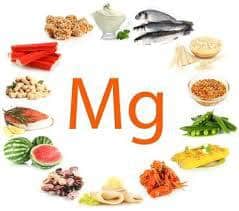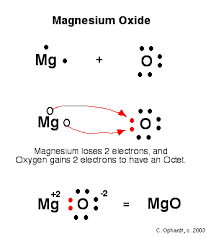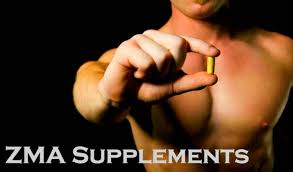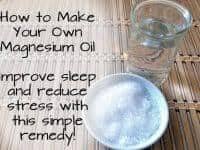Magnesium and Testosterone
Fact Checked On: 5-3-2018 By: Rob MillerContents
How Magnesium Affects Testosterone
What Form of Magnesium Is Best
What About ZMA
It’s Not A Simple Process
Frequently Asked Questions
Conclusion
Magnesium is one of the most important nutrients you almost never hear about, particularly when it comes to supporting healthy testosterone levels, but for many other reasons as well.
Magnesium is essential to all cells and required for over 300 enzymesto perform the chemical reactions that make your body function.
The adult human body contains about 25 grams of magnesium, primarily in bones and muscle tissue, with a small amount found circulating through the blood stream.
The Recommended Daily Allowance for adult males ranges from 400-420 mg (depending on age).
 Foods rich in magnesium include green leafy vegetables, whole grains, nuts, and seeds – in general, any food which provides dietary fiber will provide magnesium.
Foods rich in magnesium include green leafy vegetables, whole grains, nuts, and seeds – in general, any food which provides dietary fiber will provide magnesium.
Yet even though it can be eaten in abundance, most American’s don’t get enough.
In fact estimates are that between 25% and 80% of Americans are Magnesium deficient.
Symptoms of magnesium deficiency include high blood pressure, lowered insulin sensitivity, excitability, fatigue, nausea, weakness, and vomiting, and occur most often in people with Type 2 Diabetes, Gastrointestinal Diseases, and Chronic Alcohol Dependence.
Most multivitamins include Magnesium and the same can be said for most natural testosterone boosters as well.
Some contain a form of magnesium on its own, while others use the popular ZMA supplement, which is a combination of Zinc, Magnesium Aspartate, and Vitamin B6.
Typical supplementation levels are about 200mg-400mg. Your body will only absorb what it needs.
If you ingest more than that, the remainder will be eliminated as waste, and can sometimes lead to digestive disturbances.
It’s not recommended that you take Magnesium in conjunction with Calcium, as they can block each other’s absorption.
How Magnesium Affects Testosterone
Several studies have demonstrated the link between increased magnesium intake and increased free testosterone.
One 4 week studyinvolving Tae Kwon Do athletes tested 3 groups:
- Group 1 consisted of sedentary individuals taking 10 mg of magnesium per kilogram of body weight.
- Group 2 consisted of Tae Kwon Do athletes who practiced 90-120 minutes per day and also took 10 mg of magnesium per kilogram of bodyweight.
- Group 3 consisted of Tae Kwon Do athletes practicing 90-120 minutes per day and took no magnesium supplementation.
 The results showed that both exercise and magnesium supplementation increased total and free testosterone levels.
The results showed that both exercise and magnesium supplementation increased total and free testosterone levels.
All three groups saw their levels increase, with the group of athletes who also supplemented with magnesium seeing the biggest increase.
The fact that the sedentary group saw testosterone levels increase shows that magnesium, even on its own, can increase levels.
Another study, conducted in Italy on 400 men over the age of 65 showed that increased serum magnesium levels were independently and significantly correlated with increased serum testosterone (and IGF-1 levels), even when all other factors were controlled for.
One in vitro study from 2009 showed that magnesium blocks the action of Sex Hormone Binding Globulin (SHBG), effectively increasing level of free, bio-active testosterone.
Magnesium binds to the SHBG, preventing it from binding to testosterone, leaving it in its free and useful state.
Finally, this studyshowed a strong relationship between magnesium supplementation and muscle and bone strength.
This one did not directly study testosterone levels, but the reciprocal relationship between muscle and testosterone is clear and well known.
More testosterone helps you build more muscle, and more muscle helps increase testosterone.
Magnesium was shown to increase endurance and oxygen uptake during workouts, leading to better results.
What Form of Magnesium Is Best?

Magnesium must be attached to another substance in order for it to be effectively absorbed and used by the body, and there is a wide variety of these substances used in supplements. Most multivitamins use Magnesium Oxide (bound to oxygen), which happens to be the least absorbable form, but with the highest magnesium percentage of magnesium per dose, so in the end, it may even out.
This form, and Magnesium Citrate, are often used as laxatives, which is a good indication that much of it is not absorbed but rather eliminated as waste.
One of the more bio-available forms is Magnesium Aspartate, which is the kind found in my top choice in testosterone booster formulas, Testofuel.
What About ZMA?
 ZMA is a very popular component in natural testosterone boosters.
ZMA is a very popular component in natural testosterone boosters.
ZMA represents the combination of Zinc Monomethionine Aspartate, Magnesium Aspartate, and Vitamin B6.It’s used by athletes and bodybuilders for the several benefits it provides:
- Improved muscle recovery.
- Better sleep.
- Increased protein syntheses for greater muscle growth and strength.
- Increased testosterone.
But that last benefit, the one we’re most concerned with here, is not exactly supported by the science.
Each of the components of ZMA have distinct as overlapping health benefits, and they have each been shown to contribute to the making of testosterone and/or the boosting or free testosterone levels.
But when taken as ZMA, the studies for the most part haven’t borne out.
A study in 2000showed that when a group of college athletes who also worked out twice a day were given ZMA at before bedtime for 8 weeks, their free testosterone levels increased by more than 30% while the placebo group saw a decrease of 22%.
But according to WebMD, this study has been debunked by the majority of the scientific community due to the fact that one of the principal researchers had an ownership stake in the original ZMA formula, thereby creating a conflict of interest.
Since that study, none have been able to replicate the results.
So while the components, Zinc, Magnesium, and Vitamin B6 all contribute to good health, and even correlate positively with testosterone levels, there is no direct concrete evidence that ZMA as a supplement increases testosterone.
It’s Not A Simple Process
This just highlights the notion that increasing testosterone is a multi-faceted process that takes more than just popping a pill.
The foods you eatare extremely important, as is working out with resistance.
For a great guide on all the best methods, sign up for my free How To Boost Testosterone Naturally ebook
Frequently Asked Questions
How does magnesium differ from Zinc when it comes to Testosterone?
You’ll often see Zinc and Magnesium discussed together in articles devoted to increasing testosterone.
This is largely because of the prevalence of ZMA supplements, but also because they are both minerals with a known correlation to testosterone levels.
Zinc is involved in the biological process that produces testosterone, while Magnesium increases free testosterone by blocking SHBG.
Another big difference is that most Americans get all the zinc they need from the foods they eat, while conversely, most Americans are actually deficient in Magnesium.
Are Magnesium Oils just as effective at increasing testosterone?
 Because of the difficulty magnesium has being absorbed through the digestive system, oils applied topically to the skin may be an even better option than supplement pills.
Because of the difficulty magnesium has being absorbed through the digestive system, oils applied topically to the skin may be an even better option than supplement pills.
It’s very common for athletes to apply magnesium oil to the skin after a particularly rough competition or workout.
Not only does it help you meet your nutritional need for magnesium, thus supporting testosterone levels, but it may also help alleviate pain and inflammation of joints and muscle tissue.
When you work out, you lose most of your body’s testosterone through sweat, making the post workout magnesium oil application perfectly timed to replace what’s lost.
Using the oil can also provide you with higher doses than you can take orally, because high doses taken orally will often cause diarrhea, which is why magnesium is commonly used in stool softeners and laxatives.
What Foods contain high levels of Magnesium?
If you want to increase your magnesium levels without supplementation or oils, you can use your diet.
Make sure to incorporate plenty of magnesium rich foods, such as:
- Dark Chocolate with 64 mg per 1 ounce serving.
- Avocado with 58 mg per one medium fruit.
- Cashews with 82 mg per 1 ounce serving.
- Black Beans with 120 mg per 1 cup serving.
- Pumpkin Seeds with 150 mg per 1 ounce serving.
Tofu is high in magnesium as well, but being made of soy, you don’t really want to eat it if you’re trying to boost testosterone levels.
What else can I do to increase my testosterone?
Increasing testosterone naturally is an involved process and includes many aspects of a healthy lifestyle.
You need to eat a clean healthy diet with the right macro nutrients, including saturated fats, cholesterol, zinc, magnesium, and many others.
You need to work out regularly with weight resistance.
Avoid overdoing it on the cardio, which tends to lower testosterone levels, not raise them.
It also helps to get at LEAST 7 – 8 hours of sleep each night.
The key is to find out EXACTLY what is the cause of your low testosterone, and then working on a plan to reverse the symptoms.
For more information, tips, and guidelines, check out my in depth report on how to increase testosterone levels naturally here.
I also recommend you take our 2 min. quiz to find out if you are actually suffering from Low T.
Conclusion
Falling testosterone levels is a simple, unavoidable fact of aging, but that doesn’t mean you have to go down without a fight.
For most guys, the issues never reach a level where you need to use Testosterone Replacement Therapy, and that’s a good thing because TRT is expensive, a hassle, and riddled with side effects.
A better option for almost everyone is to make lifestyle changes that create a better environment for natural testosterone production as well as for maintaining high levels of free testosterone
Magnesium is an essential nutrient for over 300 bodily processes, including both the production of testosterone and the blocking of Sex Hormone Binding Globulin (SHBG) to help more of your total testosterone remain free.
Combined with other testosterone-friendly lifestyle choices like eating foods high in zinc, getting enough saturated fat and dietary cholesterol, and lifting weights, increasing your magnesium intake will support higher levels of the anabolic hormone.
Ask A Question
User Questions and Answers
I know magnesium is important for testosterone.
Are fish oils important or an aid in helping testosterone supplements? -Mark
Yes and no. On the one hand, Fish Oil provides polyunsaturated fat, which is generally thought of as healthy fat, but the kind of fat needed for testosterone production is saturated and monounsaturated. On the other hand, fish oil can inhibit the action of SHBG, increasing amounts of total testosterone that remain free.- Rob




